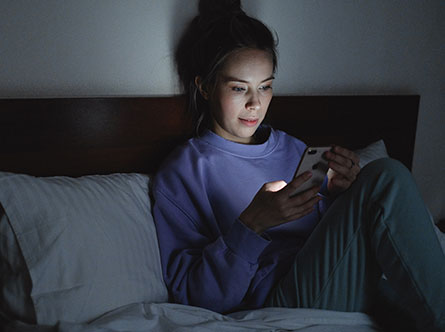Most of us view some type of electronic device for many hours each day. This includes TVs, smartphones, tablets, and gaming systems. But how does the blue light from those screens affect our health?
Melissa Barnett, principal optometrist at the UC Davis Eye Center, explains blue light and its impact on your eyes and health.
What is blue light?
Blue light is part of the visible light spectrum – what the human eye can see. Vibrating within the 380 to 500 nanometer range, it has the shortest wavelength and highest energy.
About one-third of all visible light is considered blue light. Sunlight is the biggest source of blue light. Artificial sources of blue light include fluorescent light, LED TVs, computer monitors, smartphones, and tablet screens.
Are there health benefits of blue light?
Blue light boosts alertness, helps memory and brain function, and elevates mood. It regulates your body's natural wake and sleep cycle (circadian rhythm). Sunlight is also important for the growth and development of eyes and vision in children.
Learn about conditions related to vision and eye health
How harmful is blue light?
Blue light exposure from screens is small compared to the amount of exposure from the sun. However, there is concern about long-term effects of screen exposure from digital devices. This is especially true when it comes to too much screen time and screens too close to the eyes.
According to the Vision Council, 80% of American adults use digital devices more than two hours per day. Nearly 67% use two or more devices at the same time. Fifty-nine percent have symptoms of digital eye strain.
Since our eyes are not good at blocking blue light, nearly all visible blue light passes through the front of the eye (cornea and lens). It then reaches the retina, the cells that convert light for the brain to process into images.
Constant exposure to blue light over time could damage retinal cells and cause vision problems such as age-related macular degeneration. It can also contribute to cataracts, eye cancer and growths on the clear covering over the white part of the eye. According to a vision study by the National Eye Institute, children are more at risk than adults because their eyes absorb more blue light from digital devices.
People also tend to blink less when using digital devices, which contributes to dry eye and eye strain. Other common signs of eye strain include headaches, blurred vision, and neck and shoulder pain. According to the Vision Council, 27% to 35% of Americans reported experiencing one of these symptoms after using digital devices.
Learn about macular degeneration stages, symptoms and when to get an eye exam
How does blue light affect sleep?
Exposure to blue light before bedtime also can disrupt sleep patterns as it affects when our bodies create melatonin. Interruption of the circadian system plays a role in the development of type 2 diabetes, heart disease, cancer, sleep disorders, and cognitive dysfunctions.
Get tips to sleep more soundly and why sleep is important to your health
Will blue light glasses help with eye strain?
While there are many studies on blue light glasses, there isn't consensus. However, they can help protect eyes from eye strain caused by overexposure to blue light. If you spend a lot of time using digital devices and notice digital eye strain, blue light glasses may be helpful.
Are blue light glasses worth it?
Wearing blue light glasses during the day can help people fall asleep, stay asleep, and have a more restful sleep. Generic lenses that filter blue light reduce negative effects by 10% to 23% without reducing quality. Computer glasses with yellow-tinted lenses may increase comfort when viewing digital devices for long periods of time.
How can I reduce negative effects of blue light?
- Get blue-light filters for your smartphone, tablet, and computer screen. The filters prevent much of blue light from reaching your eyes without affecting the visibility of the display.
- Follow the 20-20-20 rule to reduce digital eye strain. Take a 20-second break to view something 20 feet away every 20 minutes.
- Control lighting and glare on your device screen. Set up a good working distance and posture for screen viewing. Confirm that even minor vision problems are properly corrected.
- Talk with your eye doctor about blue light protection and digital device use at your next eye examination.
View our services and specialists at the UC Davis Eye Center




